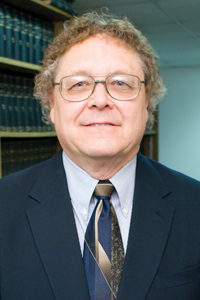 |
Dennis Weisenburger, M.D. |
NOTE: This profile is part of a series highlighting the 23 researchers who were named UNMC Distinguished Scientists or New Investigators for 2008. Each of these researchers will be profiled in UNMC Today leading up to a March 16 ceremony to recognize their achievements.
- Name: Dennis Weisenburger, M.D.
- Title: Professor of pathology and microbiology
- Joined UNMC: 1984
- Hometown: Glen Ullin, N.D.
Describe your research in layman terms, please.
I am a pathologist who diagnoses and studies diseases of the blood forming organs and the immune system. My research has focused primarily on one group of diseases called non-Hodgkin lymphoma (NHL). During the last 25 years, our group has studied the clinical, pathologic, immunologic, biologic, cytogenetic, molecular and epidemiologic characteristics of NHL and related disorders.
What led you to pursue this area of research?
During my pathology residency at the University of Iowa, l had some wonderful mentors who stimulated my interest in this discipline called hematopathology, and I subsequently pursued a clinical and research fellowship with a famous hematopathologist named Henry Rappaport, which launched my career.
How do you see your research contributing to science?
Our group has recently studied the gene expression patterns and genetic abnormalities of various types of NHL to better understand the molecular pathways involved in causing disease. This could lead to better and more specific therapies in the future. We also have been interested in lifestyle and environmental factors which increase the risk of developing NHL with the intent of preventing the disease.
Why did you become a scientist?
I have always loved math and science, particularly human biology and immunology. Actually, my mother gave me a choice when I was a boy to either become a minister or a doctor, and I picked the latter.
What is your hope for the next generation of scientists?
I hope that physicians will continue to also train as research scientists so that the important clinical issues will be addressed in the future.
Beyond grant funding, how do you measure success?
I measure success by the overall productivity of our group with regard to publications in quality journals, as well as being leaders in the field of diagnostic and research hematopathology. I also take pride in our fellowship training program and in the success of our clinical programs in hematology and oncology at UNMC.
What would you tell a student interested in a research career?
I would say to follow your heart and get the best training possible with an outstanding mentor. A research career is not an easy path to follow, but I love my work and look forward to coming to work most days. The work is fun and stimulating, and technology is changing so fast today that there are always new ways to answer old and vexing questions.
Do you have a hero/role model? If so, what do you admire most about this person?
Dr. Thomas Hodgin, the discoverer of many new diseases including the one named after him, Hodgkin lymphoma. He was a respected clinician who also studied disease in the first pathology laboratory, the autopsy suite. He was a wonderful teacher and an astute observer of all things medical and biological in his day. He was also very concerned about the moral and social issues of his day, such as slavery, abuse of native cultures, child labor, and public hygiene, and he worked actively to change the world for the better.
Tell us about your family and hobbies outside of the lab.
I have a wonderful wife of more than 30 years and three great sons, a biomechanical engineer, a financial analyst, and an aspiring college student. Family has been an important part of my life. I love to read, and hunt and fish, as well as follow Husker football and baseball. I also do my own investing and am actively involved in my church and various related charities.
List three things few people know about you.
- I grew up in a small town in North Dakota and shined shoes in my dad’s barber shop for spending money as a boy;
- I once scored 50 points in a high school basketball tournament game; and
- I won the pathology award in medical school, but never dreamed that I would one day become a pathologist.